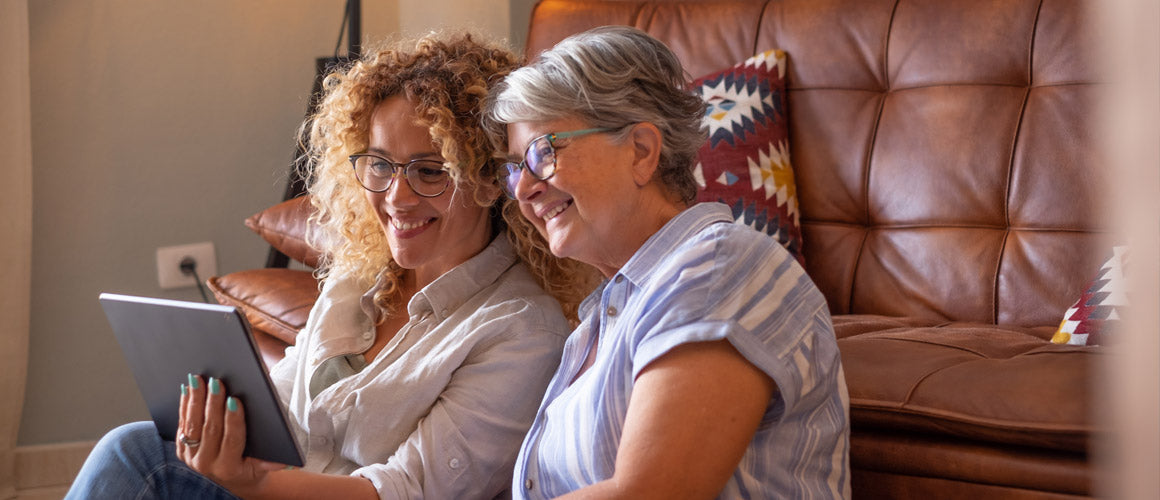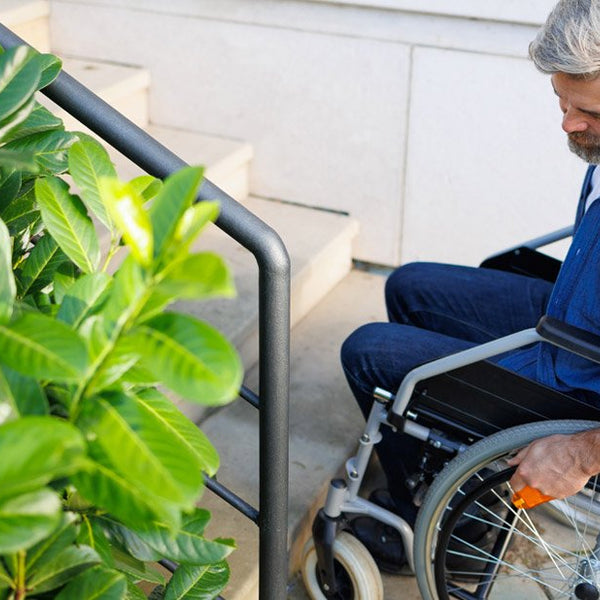Technology such as smartphones and tablets have transformed the ways many of us engage with each other and the online world, especially since the outbreak of the COVID-19 pandemic, which made in-person contact more challenging.
For older adults, learning to use new technologies can sometimes feel quite daunting, but there are many kinds of smart devices that can make a big difference to their quality of life and help keep them connected with essential services and loved ones.
To help those in their older years, we’ve looked at some of the top smart devices available that make some aspects of life and communication a little easier (and safer).
Jump to:
- The benefits of technology for elderly living alone
- Smart heating controls
- Smart lighting and plug controls
- Voice assistant devices
- Camera doorbells
- Fitness trackers/pedometers
- Smart elderly monitoring devices in the UK
The benefits of technology for elderly living alone
If you have an elderly relative or loved one who lives on their own, possibly after losing their spouse or partner, it can be very easy for them to feel lonely and isolated at times.
They also may have some mobility issues, or not be able to get out and about as much as they used to - which can make normal daily life more challenging at home and mean that they don’t see or spend time with as many people these days.
There are lots of types of technology that can help older people communicate with others, combat loneliness, stay healthier, safer and assist with some things around the home, but it can sometimes feel like a bit of a struggle to teach your elderly loved one how to use new devices.
We’ve chosen some top tech that can make a positive difference to someone’s daily life and while some minimal set-up might be needed initially, all these kinds of devices are known for their simplicity and ease of use, which is great news for those who find some technology a challenge.
1. Smart heating controls
With the rising costs of energy becoming a big concern for everyone, setting up your older loved one with smart heating controls can help ensure that the home isn’t being heated when it needn’t be, and makes things like changing the thermostat a doddle.
Most smart heating devices can be fitted to any existing boiler or heating system and can be linked to an app on a smartphone or tablet that is straightforward to use.
This means that not only can the heating be turned on or off easily, and the temperature of the home altered when needed - it can also potentially help save money too because the home, or even individual rooms, are only heated when needed.

2. Smart lighting and plug controls
In a similar way to heating controls, being able to turn lights on or off using an app rather than having to reach for a switch can be very handy for people of all ages, but especially useful for older adults.
Turning off all the lights when they leave the house or go to bed is really simple, as is turning lights on, or having them switch on automatically when no one is home to make it look like someone is there.
Smart plugs operate in a similar way, and can be automatically switched off overnight or when no one is home to help minimise the fire risk as well as saving on electricity when appliances aren’t needed.
3. Voice assistant devices
Voice assistants have grown in popularity over recent years, and their capabilities are constantly increasing. For example, many home voice assistants can control smart heating, lighting and plugs by voice command, which is ideal if your older loved one isn’t a fan of smartphones or tablet apps.
Once set up, the voice assistant will respond whenever your loved one uses its ‘name’ or ‘trigger word’ and can do a wide range of tasks; from playing music or interacting with other smart devices in the home, to reminding the elderly person to take their medication at a certain time.
Most devices of this type can also make voice phone calls with just a command, which can be vital in an emergency or if your loved one isn’t near their phone.
Voice assistants can also answer questions, such as ‘will it rain today?’ and other useful queries, which can help older adults not only get the information they need, but also not feel so alone if they live on their own.
4. Camera doorbells
Many older people who live alone can feel vulnerable when the door goes, especially if they are not expecting someone.
A doorbell with a built-in camera can give them (and you) real peace of mind that they know who is at the door - they can even speak to the person before answering and can therefore choose not to open the door if they don’t want to.
This is a really useful device and can help your elderly loved one feel more secure in their own home.

5. Fitness trackers/pedometers
For many people in their later years, general aches, pains, medical conditions and sometimes just a lack of motivation can mean that they live a more sedentary lifestyle than they used to.
However, evidence shows and the NHS advise that older adults can really benefit from regular gentle exercise. It can help prevent some serious medical condition from developing and make a big difference to their quality of life.
A device such as a smart watch, personal alarm watch for the elderly, fitness tracker or a pedometer can help track all kinds of physical activity and gives your elderly loved one a realistic target each day for activity that can help them stay healthier for longer, both in body and mind.
Exercise is known to improve strength, balance and flexibility, which are all major considerations as we age. Whether it’s getting up regularly to put the kettle on, doing some light housework or going for a stroll outside, these devices can monitor it all and let the wearer know where they are up to with their daily target.
6. Smart elderly monitoring devices in the UK
Knowing that an elderly relative or loved one spends a large proportion of their time at home, alone, can be a real worry - even if they are relatively fit, well and active currently.
This concern is a major reason why movement sensors for the elderly are now available.
These smart home monitoring devices are placed in a variety of locations around the older person’s home and detects motion – all the while the powerful Artificial Intelligence (AI) platform learns their routines and what is ‘normal’ in the home.
This can be anything, from the first time they turn on the kettle for their morning cuppa, to the temperature of the property and how your loved one moves through their home as they go about their usual activities.
This type of motion sensor for elderly people in the UK doesn’t have a camera or microphone, so your loved one maintains their privacy. Plus, once installation has taken place, the devices don’t need charging or require regular maintenance, so in most cases they simply become part of the home.
However, this new ‘part of the home’ can also help keep your loved one safe and raise an alert if anything unusual happens.
Paired with a personal alarm that can be pressed by the older person if they have a fall, feel unwell or need some reassurance at any time of the day or night - the emergency response team can alert family members, designated carers or the emergency services if required.
There can be a tendency amongst some older people that new technology is something to be feared or isn’t for people like them. We hope that some of our suggestions might help to show some of the many benefits of smart technology for the older generation and how it can help keep them safe and living a good quality of life in their own home for longer.
Find out more about TakingCare Safe Home Alert and read our household tips for seniors.


